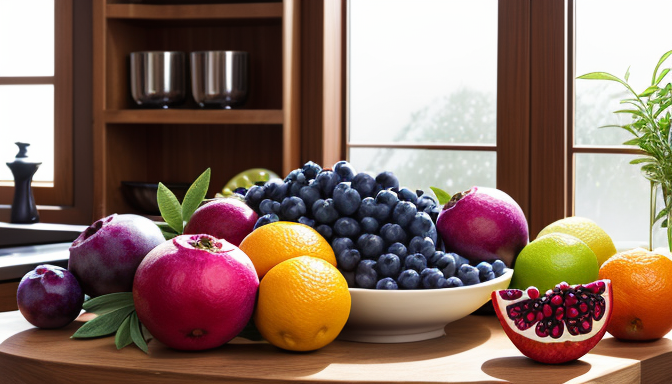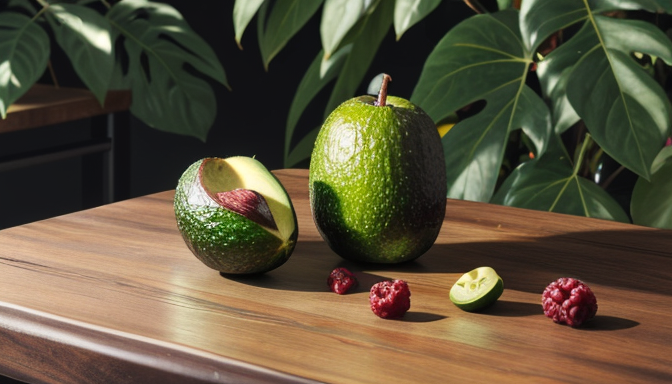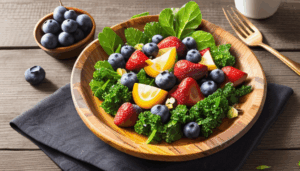As we journey through life, the quest for longevity and vitality becomes increasingly important. One of the key players in this pursuit is antioxidants. But what exactly are they, and why are they so crucial for aging gracefully? Antioxidants are compounds that help neutralize harmful molecules known as free radicals. These pesky little guys are byproducts of normal cellular processes and can also stem from environmental factors like pollution and UV radiation. When free radicals accumulate, they can lead to oxidative stress, which is a major contributor to aging and various health issues.
Imagine your body as a bustling city. Free radicals are like graffiti artists running rampant, causing chaos and damage wherever they go. Antioxidants, on the other hand, are the dedicated cleanup crew, tirelessly working to restore order and protect the integrity of the city. By neutralizing these free radicals, antioxidants help minimize cellular damage, keeping our bodies functioning optimally as we age.
Incorporating antioxidants into your daily routine can be a game-changer. They not only combat the signs of aging but also offer a plethora of health benefits. From boosting your immune system to enhancing skin health, these compounds are essential allies in maintaining vitality. So, how can we ensure we’re getting enough antioxidants? Well, the answer lies in our diet. A colorful plate filled with fruits, vegetables, nuts, and whole grains can significantly elevate your antioxidant intake, promoting better health and longevity.
In summary, antioxidants are vital for aging well because they protect our cells from damage, enhance our overall health, and help us maintain a youthful appearance. Embracing a lifestyle rich in antioxidants is one of the most effective strategies for promoting longevity and vitality. So, why not start today? Your future self will thank you!
The Science Behind Antioxidants
Have you ever wondered what keeps your body ticking like a well-oiled machine? One of the unsung heroes in this process is antioxidants. These powerful molecules work tirelessly to combat oxidative stress, which is a fancy term for the damage caused by free radicals—those pesky little byproducts of cellular metabolism that can wreak havoc on our bodies. Think of free radicals as tiny firecrackers that, if left unchecked, can lead to a full-blown explosion of cellular damage, contributing to aging and various health issues.
At a molecular level, antioxidants neutralize these free radicals, effectively putting out the fires before they can spread. This is crucial because oxidative stress is linked to a myriad of conditions, including heart disease, cancer, and neurodegenerative disorders. When antioxidants donate an electron to a free radical, they stabilize it, preventing it from causing further harm. It’s like giving a firecracker a safe place to land instead of letting it explode in your living room!
But not all antioxidants are created equal. They come in various forms, including vitamins like Vitamin C and Vitamin E, minerals such as selenium, and a host of phytochemicals found in plants. Here’s a quick look at some key players:
| Antioxidant | Source | Benefits |
|---|---|---|
| Vitamin C | Citrus fruits, strawberries | Boosts immune function, skin health |
| Vitamin E | Nuts, seeds, spinach | Protects cell membranes, skin health |
| Selenium | Brazil nuts, seafood | Supports metabolism, thyroid function |
Understanding the science behind antioxidants not only illuminates their vital role in promoting health but also empowers us to make informed choices about our diets. By incorporating a variety of antioxidant-rich foods into our meals, we can effectively arm our bodies against the relentless march of time and enhance our overall well-being.

Health Benefits of Antioxidants
Antioxidants are not just a trendy buzzword; they are essential compounds that can significantly enhance our health as we age. Imagine your body as a bustling city, where free radicals are the troublesome vandals that wreak havoc on the streets, damaging everything in their path. Antioxidants act as the vigilant security team, neutralizing these vandals and preventing them from causing chaos. This protective role is crucial for maintaining our overall well-being and vitality.
One of the most celebrated benefits of antioxidants is their ability to improve skin health. As we age, our skin becomes more vulnerable to environmental stressors like UV rays and pollution. Antioxidants help combat these harmful effects, promoting a radiant and youthful complexion. Studies have shown that a diet rich in antioxidants can lead to improved skin elasticity and a reduction in the appearance of wrinkles. It’s like having a natural shield that keeps your skin looking fresh and vibrant!
Moreover, antioxidants are known to enhance immune function. They help strengthen our body’s defense mechanisms, making us less susceptible to illnesses and infections. Think of them as the loyal bodyguards that keep your immune system in top shape. With a robust immune system, you can enjoy life with fewer sick days and more energy to pursue your passions.
But that’s not all! Antioxidants also play a significant role in reducing the risk of chronic diseases such as heart disease, diabetes, and even cancer. By combating oxidative stress and inflammation, they help protect our cells from damage that could lead to these serious health issues. Incorporating antioxidants into your daily routine is like investing in a long-term health insurance policy for your body.
In summary, the health benefits of antioxidants are vast and varied. From enhancing skin health to boosting your immune system and reducing the risk of chronic diseases, they are vital for anyone looking to age gracefully and maintain their vitality.
Natural Sources of Antioxidants
When it comes to boosting your antioxidant intake, nature truly has a cornucopia of options. Imagine walking through a vibrant market filled with colorful fruits and vegetables, each one a treasure trove of health benefits waiting to be discovered. Antioxidants are found in a variety of foods, and incorporating these into your diet can be both delicious and rewarding. Think about it: every bite of a juicy berry or a crisp vegetable is like a little shield for your cells, protecting them from the damaging effects of free radicals.
Fruits such as blueberries, strawberries, and oranges are particularly rich in antioxidants. For instance, blueberries are not only tasty but also packed with anthocyanins, which are known to combat oxidative stress. On the other hand, green leafy vegetables like spinach and kale are loaded with vitamins and minerals that work synergistically to enhance your body’s defenses. These foods are not just good for your health; they are essential for maintaining vitality as you age.
Moreover, nuts and seeds, such as walnuts and sunflower seeds, are excellent sources of antioxidants. They provide healthy fats along with a powerful punch of nutrients. Did you know that dark chocolate, in moderation, is also a great source? Yes, you can indulge your sweet tooth while doing something good for your body!
Incorporating these foods into your daily meals can be easy and enjoyable. You might start your day with a smoothie loaded with spinach, banana, and a handful of berries, or enjoy a colorful salad topped with nuts and a drizzle of olive oil. The possibilities are endless!
So, the next time you’re at the grocery store, remember to fill your cart with these antioxidant-rich foods. Not only will you be treating your taste buds, but you’ll also be investing in your long-term health, ensuring that you age gracefully and vibrantly.

Antioxidants and Skin Aging
As we age, our skin naturally undergoes changes that can leave it looking less vibrant and more tired. One of the biggest culprits behind this is oxidative stress, which is caused by free radicals attacking our skin cells. This is where antioxidants come into play. They act like tiny superheroes, swooping in to neutralize these free radicals and protect our skin from damage.
Imagine your skin as a delicate balloon; over time, exposure to UV rays, pollution, and stress can cause it to lose its elasticity and strength. Antioxidants help to keep that balloon inflated by combating the wear and tear that comes with daily life. By incorporating antioxidant-rich foods into your diet, you can significantly enhance your skin’s resilience. Some of the best sources include:
- Berries – Packed with vitamin C and other antioxidants.
- Green tea – Contains polyphenols that protect skin cells.
- Nuts – Especially walnuts, which are rich in omega-3 fatty acids.
- Dark chocolate – Yes, you read that right! It’s loaded with antioxidants.
But it’s not just about what you eat; topical applications of antioxidants can also work wonders. Creams and serums infused with vitamins C and E can help to fend off UV damage, reduce inflammation, and promote a more youthful appearance. Think of these products as armor for your skin, shielding it from external aggressors while nourishing it from within.
In conclusion, the role of antioxidants in combating skin aging cannot be overstated. They are essential for maintaining skin elasticity and reducing the appearance of wrinkles, giving you that youthful glow we all desire. So, why not start incorporating more antioxidants into your life today? Your skin will thank you for it!
Supplementation vs. Natural Intake
When it comes to getting your daily dose of antioxidants, the debate often boils down to supplementation versus natural intake. On one hand, supplements can seem like a quick fix, offering concentrated doses of antioxidants in a convenient pill form. But here’s the catch: while they may provide a boost, they often lack the full spectrum of nutrients that whole foods offer. Think of it this way: would you rather have a slice of rich, delicious chocolate cake made from scratch, or a pre-packaged slice that’s been sitting on a shelf for weeks? The homemade version not only tastes better but is also packed with wholesome ingredients that nourish your body.
Natural sources of antioxidants, such as fruits, vegetables, nuts, and whole grains, come loaded with additional vitamins, minerals, and fiber that work synergistically to enhance your health. For example, a vibrant bowl of mixed berries not only delivers vitamin C but also provides fiber and phytochemicals that can help fend off disease. Moreover, the body absorbs nutrients from whole foods more effectively than from supplements, making natural intake a superior choice for many.
That said, there are situations where supplementation might be beneficial. Individuals with specific dietary restrictions, older adults, or those with certain health conditions may find it challenging to get enough antioxidants from food alone. In such cases, a well-chosen supplement can help fill the gap. However, always consult with a healthcare professional before starting any new supplement regimen, as they can guide you on the best approach tailored to your needs.
In summary, while supplements can play a role, the best strategy for maintaining optimal antioxidant levels is to focus on a balanced diet rich in natural sources. After all, your body deserves the best, and there’s no substitute for the vibrant, life-giving energy found in whole foods!
Frequently Asked Questions
- What are antioxidants and why are they important?
Antioxidants are molecules that help neutralize free radicals, which can cause cellular damage and accelerate aging. They play a crucial role in maintaining overall health and vitality as we age.
- How do antioxidants benefit my skin?
Antioxidants protect your skin from UV damage and pollution, helping to maintain elasticity and reduce wrinkles. They contribute to a youthful complexion by combating oxidative stress.
- Can I get enough antioxidants from my diet?
Absolutely! Incorporating a variety of fruits, vegetables, nuts, and whole grains into your meals can significantly boost your antioxidant intake, promoting better health and longevity.
- Are supplements necessary for antioxidant intake?
While supplements can provide antioxidants, it’s generally more effective to obtain them from whole foods, as they offer additional nutrients that support overall health.
- What foods are the best sources of antioxidants?
Some of the best sources include berries, dark chocolate, nuts, green leafy vegetables, and spices like turmeric. A colorful plate often indicates a rich supply of antioxidants!

